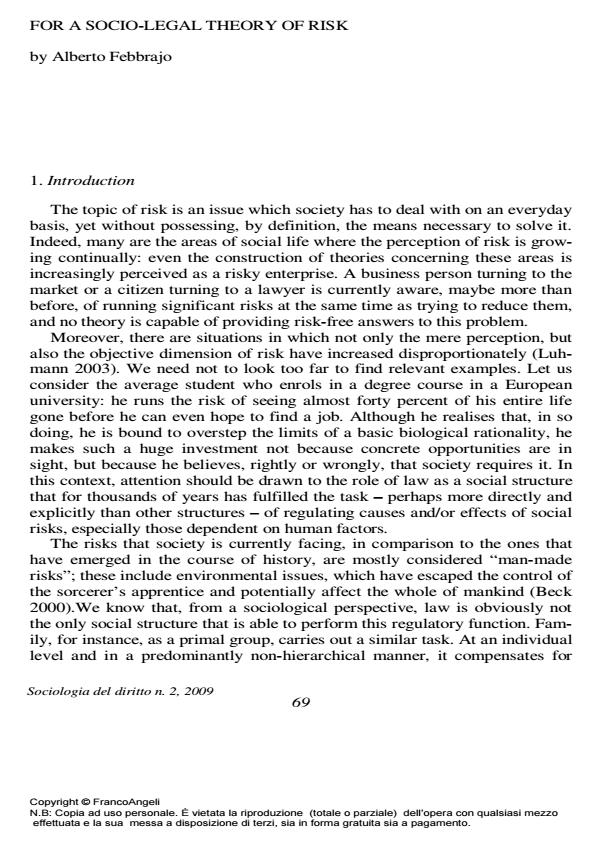For a socio-legal theory of risk
Journal title SOCIOLOGIA DEL DIRITTO
Author/s Alberto Febbrajo
Publishing Year 2009 Issue 2009/2
Language English Pages 14 P. 69-82 File size 302 KB
DOI 10.3280/SD2009-002005
DOI is like a bar code for intellectual property: to have more infomation
click here
Below, you can see the article first page
If you want to buy this article in PDF format, you can do it, following the instructions to buy download credits

FrancoAngeli is member of Publishers International Linking Association, Inc (PILA), a not-for-profit association which run the CrossRef service enabling links to and from online scholarly content.
<em>For a socio-legal theory of risk </em> - This article aims to offer an overview of some contributions to a socio-legal theory of risk. Starting from the presupposition that risk is a concept that plays a central role in sociological as well as in legal theory, it underlines the thesis that, from the point of view of the general system theory, the application of three different strategies of risk-management can be recognised in the legal system: a substantial strategy, which comprises shielding a core of legal contents from the risk of sudden and drastic changes; a social strategy, whereby risks are externalised by creating virtual figures (legal persons) which relieve "natural" persons from those risks that are particularly severe and hard to sustain in the sphere of economic activity; and a temporal strategy, in which risks are diluted by implementing procedures, i.e. sequences of operations, featuring relevance criteria of their own and by a time-frame that, to a certain extent, can be pre-determined. Moreover, in every advanced legal system, there is a need for tools for reducing or avoiding the risks produced by the current legal strategies for risk absorption. One of the main learning processes concerning the risks produced by law is democracy, which is also in turn exposed to risks. Because the present situation features profound changes in the structure of world society as a whole, which dramatically transform the types of risks confronting the legal system, the concept of law oriented to an imperativistic approach is no longer adequate. Instead, it needs to be based on a communicative approach, according to which the treatment of risks trespasses on the borders of the individual state and takes on a cultural and communicative, rather than a practical, dimension, characterised by symbolic legitimisation, virtual effectiveness and increased openness
- Regulating Undercover Law Enforcement: The Australian Experience Brendon Murphy, pp.187 (ISBN:978-981-33-6380-9)
- Governare il futuro. Materiali per una sociologia giuridica del rischio Giuseppe Campesi, in SOCIOLOGIA DEL DIRITTO 2/2015 pp.35
DOI: 10.3280/SD2014-002002 - Regulating Undercover Law Enforcement: The Australian Experience Brendon Murphy, pp.261 (ISBN:978-981-33-6380-9)
Alberto Febbrajo, For a socio-legal theory of risk in "SOCIOLOGIA DEL DIRITTO " 2/2009, pp 69-82, DOI: 10.3280/SD2009-002005